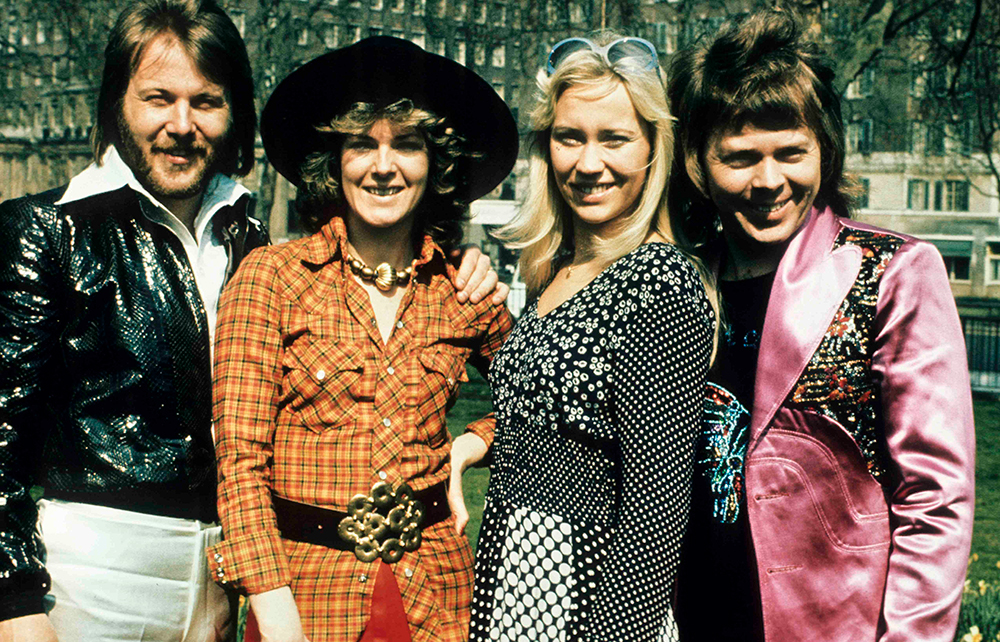Memories. Good days. Bad days. In 1992, U2 mounted their Zoo TV tour. U2 being U2, the gigs were over-earnest affairs, their showbiz razzmatazz never emulsifying with their agitprop posturing. But disbelief was colloidally suspended the night the show hit Stockholm – and U2 were joined on stage by Benny Andersson and Björn Ulväeus for a cover of ‘Dancing Queen’. In truth, that evening’s take on one of Abba’s meisterwerke was a lumpen affair. Bono had to drop his voice an octave for what ought to be the song’s soaring refrain. And while Björn looked happy enough strumming a few chords on an acoustic guitar, Benny, at a keyboard the size of a slipper, was patently flummoxed at how little of the song’s harmonic majesty could be retained when a beat combo is laying waste to your melodic line. Bono is a hard man to agree with even when he is right, but when he bowed to Benny and Björn and told them ‘we are not worthy’, he was spot on.
The clothes, it turned out, were ridiculous by design – the better to be tax deductible
Then again, says Giles Smith, in 1992 Abba themselves weren’t all that worthy. Ten years on from their break-up, their stock was low. Polygram, which had recently acquired their back catalogue, hadn’t a clue what to do with it. A little market research revealed that while people wouldn’t mind hearing Abba’s hits again, they wouldn’t want photos of the group on the album’s sleeve.
Glance through the picture section of Smith’s My My! Abba Through the Ages and you’ll be reminded why. Though what you might call the A side of Abba were as pulchritudinous as pop ever got, the group was still a mess: Benny’s beard; Björn’s barnet – not to mention his bell-bottom dungarees; and what Smith artfully calls the ‘peek-a-boo onesie’ once sported by Agnetha (blonde, soprano). Those clothes, it turns out, were ridiculous by design – the better to be tax deductible. But as Björn acknowledged: ‘We looked like nuts.’ Add in the fact that they sounded like fish (Abba was also the name of a Swedish fish cannery; the company did not object, provided the band did nothing to bring creamed crab and curried herring into disrepute), and you have to wonder how they lasted 50 minutes, let alone 50 years.
But here we are, half a century on from their triumph at the 1974 Eurovision Song Contest in Brighton, and Abba still prevail. Indeed, Smith suggests, with the stage musical Mamma Mia! packing them in in the West End these past 25 years, and Abba Voyage (a show starring digital avatars of the four), they are more present in our lives now than they were in their 1970s heyday.
This isn’t just because Benny and Björn wrote some of the catchiest tunes ever. It’s because, Smith argues, Abba were adults in the playroom of pop. Though the foursome were of an age with most of the other popsters of the 1970s – Bowie, Bolan, Elton, etc – they always seemed older. Björn and Agnetha married in 1971, and had their first child in February 1973 – a year and more before anyone outside Sweden had ever heard of Abba. And while Benny and Anni-Frid (brunette, mezzo) didn’t have children together, they did have two apiece from earlier marriages. Hence, Smith argues, the potency of Abba’s bust-up songs. They’re not just about teens going their separate ways. They ‘involve property, furniture and children’. A couple of years after its release, the Bay City Rollers’ ‘Bye Bye Baby’ can’t but have seemed callow to even its most devoted fan. Songs like ‘Knowing Me, Knowing You’ and ‘The Name of the Game’ have only accreted meaning as they – we – have aged.
Which goes to the heart of Abba’s genius. They never wrote a happy love song. Their bounciest melodies are ballasted with melancholy. Even ‘Money, Money, Money’, a tango about the joys of wealth, is in A minor. Smith is never not sharp, but he is at his most acute when he describes Agnetha (who as a child wanted to be a shrink; who never understood, let alone enjoyed, the adulation of her fans; whose mother committed suicide) ‘narrowing the gap between singing and crying until there’s only a breath between them’.
But then there is little that escapes Smith’s ears. His eyes are a little less reliable. Certainly he seems unaware that what he calls the repeated motif in Abba videos of ‘close-ups of the band as couples, one in profile, the other face-on, the focus shifting between them’ is an hommage to Ingmar Bergman’s homage to catatonia, Persona. Otherwise, he has the band bang-a-boomerang to rights. Who but he has spotted that whereas Frida dances to the rhythm of a tune, Agnetha moves to its melody? That ‘S.O.S.’s perpetually startling repetition of a musical phrase first over a minor chord then over a major chord (play it yourself and ‘you stare at your fingers in disbelief that the melody hasn’t moved’) is a steal from Richard Rodgers’s ‘My Favourite Things’? That Benny (whose solo album Piano transforms ‘Thank You for the Music’ into a Chopin ballade, and ‘The Day Before You Came’ into a mash-up of Beethoven’s ‘Pathetique, and ‘Appassionata’ sonatas) can’t read a note of music? Praise be that Smith can. And that he can write English that’s a joy to read. At last, a book that’s worthy of Abba.







Comments